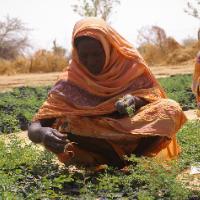IRIBA, Chad -- Four years after some quarter-million people fled ethnic cleansing in Sudan's Darfur province for the relative safety of eastern Chad, one of the world's most persistent humanitarian crises shows no signs of letting up. Indeed, there are signs that Darfuri refugees are in Chad to stay, despite acute shortages of water, firewood and food. Today the Darfuri refugees are housed in a dozen U.N.-administered camps that, over time, have become more like permanent towns and less like the squalid tent cities of popular conception. But appearances can be deceiving: Despite seeming self-sufficient on the surface, the camps rely heavily on aid groups for food, water, health care and protection -- and that's not about to change. No one tracks all donations from all sources public and private, but total U.S. State Department humanitarian aid to Darfur and eastern Chad has now reached $600 million. Last year, the State Department provided $20 million in aid to Chad alone. Food donations to the country from all sources were valued at around $240 million in 2007.
Darfur Refugees in Chad Settle in for Long Stay

